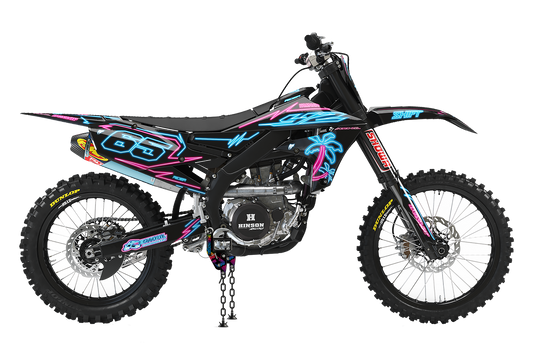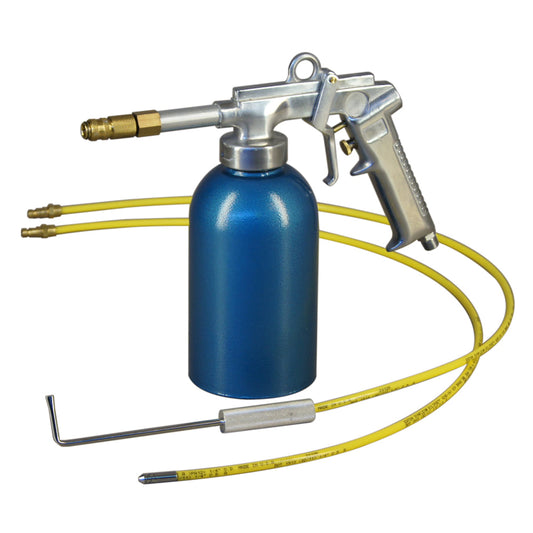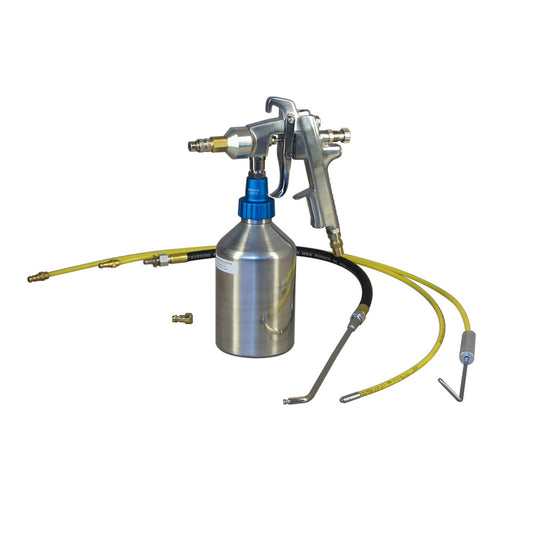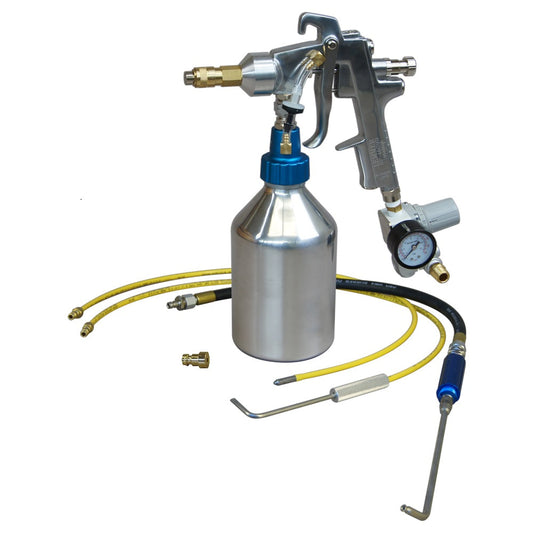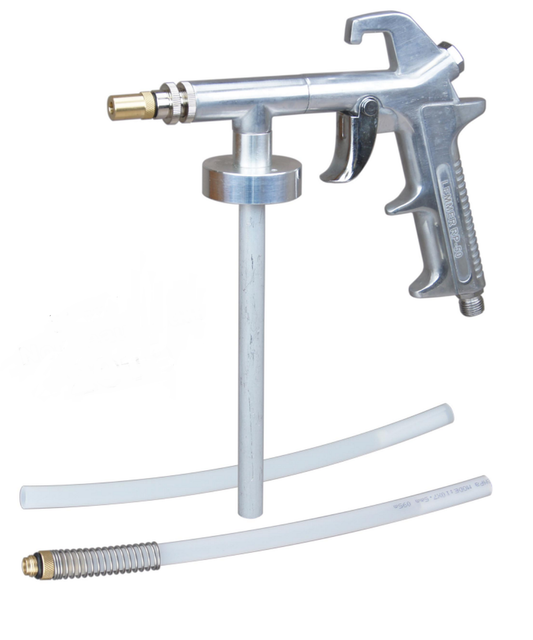
Rustproofing Pt 2
Welcome back! Here's the 2nd installment of our rust proofing & undercoating discussion. In Part 1 we discussed long-life products as well as paint protection and much more. We'll discuss vehicle body maintenance, annual products, homebrew products and a few other related subjects.
- Washing your Vehicle
- Annual or Semi-annual
- Self applied vs Professional installation.
- Time of year to apply Rustproofing
- Problems
- Installers
- Manufacturers Warranties
- Home brew methods
- Can You Rustproof a Rusty Car?
- What about restoring a rusty car?
- Questions to ask before deciding on a product/method
- How does rustproofing pay me back?
Washing your Vehicle
Salt naturally accumulates on your vehicle from winter driving during the winter in the salt belt. Regular washing, including a thorough underbody wash is a sound strategy for helping to keep rust at bay. Look for car washes that have an underbody wash. Or, if you have a place to do it at home you can use an underbody wash attachment for your powerwasher. Additionally, some DIY car wash facilities have underbody attachments available to use. Keep in mind that washing the underbody can remove some of the rustproofing that you installed in the fall, especially if it's an annual product.
Annual or semi-annual
When you google 'Rustproofing near me' or similar, for Automotive rustproofing, there are several common brands which are likely to show up in your search. These are typically applied on an annual basis. They include Krown Rustproofing, Rust Check, Corrosion Free, Fluid Film, Oil Gard, Woolwax, Prolab, Extreme Guard, NHOU, Proform, Extreme Guard and more, plus there are many shops spraying generic no-drip oil sprays which is a light oil with a high dissolved wax content, making the product partially jelly-like.
Of these, all need to be applied at least annually. Sure, some brands promise 18 months, or 2 years, but they really still should be done at least once a year. In many cases, they should be done 2x per year, especially If you do a lot of winter driving. Cars rust in the spring when the weather warms up, so that should be kept in mind when considering how often to have your car sprayed.
How do various brand name products really work? Here is a video that shows a pretty extensive set of tests for many of the products discussed in this multi-part article. It's gives a good idea how they perform under various real world simulations.
There are a few other well known videos on Youtube including ones on the Repair Geek and Project Farm channels. In some of them, they have tested non-typical products such as LPS, CRC, Flex seal, WD-40 etc., with test results showing varying degrees of success from the individual products. Some aren't even marketed for rustproofing applications, but are being tested to see how they perform in that role.
If you were to use some of these products individually, I'd suggest that you should at least get better results than if you did nothing to protect your car. Remember, doing something is always better than doing nothing, with the exception of Rubberized/Asphalt and Electronic methods(which are just bad news).
However, many of these products aren't professionally applied by installers and they may be a bit of a challenge to obtain by the average person, as some are only sold thru industrial channels. It also means that you will have to DIY the install on your vehicle.
As near as I can tell, most, or all of these products are petrochemical based. The exceptions are the Lanolin based, Ceramic and seed oil based products, as detailed in Pt 1. So far I haven't seen how any of them affect rubber/silicone seals, or wiring insulation...Perhaps we need a test on Youtube for that....?
Professionally Installed vs DIY
For many, going to a local shop or franchise is the obvious way to do it. You may not have the space, ability, equipment, willingness, or time to do it yourself; You simply book your appointment time, show up & then the staff handles everything from there, usually finishing and returning your vehicle to you in an hour or so, or possibly keeping the vehicle for a day, depending on the type of product. Easy and Done.
All the mess stays at the shop (usually) and you can spend your time doing other things.
You'll typically pay somewhere between $100 and $200 for the service for any of the annual products, depending on size of vehicle, location and the product being sprayed, or $500-$1500 for the long-life products such as Waxoyl, Honey seal and so on.
The downside is that you have to trust that the installer will do a thorough job and you'll pay market rates. If there are other mechanical issues with your car, the installer may not notice them, and/or may not communicate them to you.
However, for many others, they want to DIY to save some money and also have the satisfaction of doing the job themselves. This also gives them a chance to inspect the underside of their vehicle and look for problems. A DIYer will at least need to have a minimum of equipment, time and space to take on the project. You'll usually need an air compressor, jack, car ramps, and/or jackstands, as well as some spray equipment. However some kits are available that don't require any spray equipment. These kits use aerosols and come complete with everything you need.
What time of year should you apply rustproofing?
If you have just bought a new vehicle, rustproofing and paint protection should be first on your list and should be done as soon as you take delivery, regardless of the time of year.
If you are installing a long life product, such as Waxoyl, you won't have to be concerned about the product washing off your vehicle. You will only need to book in regular inspections 1-2x a year.
If you plan to use an annual product, you should apply it when the vehicle is new, then again in the fall or spring, depending on when you bought it. Then spray each year in the late fall at a minimum. However spraying again in the spring is advised, as that is when cars actually rust- when the weather is warming up.
Problems -
Many of the annual products may come an assortment of minor problems, again depending on the product, installation and vehicle. Some of these issues are; swelled seals and rubber components, swollen wiring insulation, post-installation dripping - which can mean a mess on your driveway, seeping onto painted surfaces, soaking up dirt & trapping moisture with that soaked up dirt. Annual products also tend to wash off easily from road spray or car washing. Hence the reason that they need to be reapplied at least 1-2x per year.
The lighter components will also will seep out onto the body exterior and attract dirt, making the vehicle look messy. However, that is a good sign, as the seeping indicates that the product is working. It just looks messy, but doesn't cause any harm to the body or paint otherwise. It is easily cleaned off with a mild detergent and water.
Installers
Assuming you want to have your rustproofing professionally installed, you'll want to see if there is a local installer. That info should be provided on the parent company's website. A local web search will also provide you with options. Additionally, word-of-mouth thru family and friends, or from automotive related pages and forums can also give you candidates.
Manufacturers warranties, Tesla etc.
It's worth mentioning that you should check with your manufacturer's warranty(if the vehicle is still under warranty) regarding rustproofing or undercoating. Most manufacturers will have some recommendations about rust prevention, etc., to protect your vehicle. It will either be written in the owners manual or warranty package. Pay attention to any types of products they either recommend or suggest you avoid.
Tesla is one of the only manufacturers that specifically asks you not to install any rustproofing at all, else they will void your warranty, which is for 12 years on the body. However, you should read their warranty very carefully, as it is worded(as of this writing) in such a way that it really provides almost no warranty at all.
You have to ask yourself, what's better for you?; ensuring that your new Tesla is protected, or wait out the 12 yr 'warranty'? If you wait out the warranty, it will likely be much too late to do much of anything at that point, as any rust will be well established on the vehicle. At that point, all you can do is apply a good annual product 2x a year which will buy you maybe a few more years of vehicle life. Alternatively, you can spend a whole bunch of money of rust removal and body work, to restore the car.
What about for a car that is being stored?
If you are storing a vehicle, it should definitely be rustproofed. Condensation is very common on vehicles as the weather temps change in spring and fall. Naturally, rust will happen. Protecting your vehicle in the body cavities and underneath should be top priority before it goes into storage.
Home brew methods
There are quite a few methods to rustproof that you can literally 'cook-up' at home. The adherents often swear by them and chances are that these products will work at least as well as many of the brand name products. They are usually quite affordable. However, you will need your own spray equipment and a place to spray your vehicle. The process is messy as well.
Vaseline and ATF or mineral oil. This approach uses melted vaseline and either ATF or mineral oil to protect vehicles. You warm the vaseline up on a hot plate or double boiler. You can probably even mix them together and spray into all the body cavities and onto the underbody. You probably only use about 10 or 20 dollars worth of product to treat a midsized car.
Oil and/or grease and parrafin wax. This usually involves using a number of wax toilet flange seals and/or getting bars of parrafin wax. The oil can be motor oil, gear oil, Bar and chain oil, or something else. The grease is usually wheel bearing grease or something similar. This approach also involves heating up the ingredients til they are fully melted, then fully mix them together and spray on the vehicle while they are still warm. The product then cools down and becomes semi-solid, offering some durability against road spray. Linseed oil is also sometimes used in place of, or in addition to regular oil.
Bar and chain oil. This is the oil used for chainsaws to lubricate the bar and chain. It's quite sticky, so it has good adhesion. It is sometimes used in conjunction with other lighter products, with the B&C oil applied to the underbody and the lighter oils such as ATF applied to body cavities. Some folks will mix B&C oil with grease and/or wax and/or other products to get their own special formula.
Used oil. This is an old standard that probably dates back to the very first attempts at rustproofing. Simply spraying used motor oil on the vehicle. It's cheap and certainly better than nothing, but it tends to be quite messy and will drip for days.
The above are just a few examples of home brew methods. Additionally, there are many others that mix and match products, or add in other products, trying for that perfect combination.
Can you rustproof a rusty car?
Once a car has some rust on it, It can definitely still be rustproofed. The question is- how rusty? If the car is only a few years old and has minor surface rust on the frame/chassis and underbody, you should definitely get if rustproofed once or twice a year to keep things in check and really protect you vehicle.
If you see bubbling paint on the body, or even small holes, that's a sure sign that the rust is much worse than it appears. For sure. the under body and/or chassis/frame will likely be quite rusty by the time you see rust on the body. Cars typically display body rust on the exterior later on in the cycle. It's sorta like a canary in the coal mine that shows up for work late. By the time you see the problem on the painted body, you've got a problem & you need to get rustproofing on, pronto. You'll really need to keep an eye on things & should probably start saving for your next car.
However, if there's still solid metal behind all the rust underneath, then there's still benefits to protect the vehicle.
You'll need a good annual product at this point and anything you do will be to extend the life of the vehicle for a few more years.
What about restoring a rusty car?
This process covers a lot of territory, as it can be as simple as removing light rust from the underbody of a vehicle to doing a full frame-off rotisserie restoration & using a dunk tank for removing rust.
For small jobs you can use simple spray-on, or brush-on rust removal products such as, Evapo-Rust, Krud Cutter - The Must for rust, CLR etc. You can also use a wire brush or wheel, or a needle scaler or similar to remove some heavier stuff first, then follow up with the spray-on or brush-on products.
There are also rust converter and rust converter paint products that convert rust into a dark Iron-Phosphate coating which can often be painted. This approach is best if the rust is just surface rust. Common products include Rust Check Rust Converter, POR-15, Beest Rapid Rust Converter, Rustoleum Rust Reformer, Eastwood, Loctite, Corroseal, Rust Kutter and more. However, some tests have shown that the converted rust from many of these products doesn't adhere to the parent metal very well. Keep that in mind when looking for a solution.
Many folks will opt for a good rust paint as part of their solution. This includes products such as Rust check Rust Killer, Rustoleum and others.
At the next level you can use sand blasting, dry-ice blasting, or laser rust removal. For full-on restoration jobs, it's probably best to remove the body and use a large chemical dip tank to remove all the rust. This process involves removing everything from the body and then lowering it into a large tank filled with caustic agents, which clean and strip the paints and primers from the body, then washing it, then lowering it into a 2nd tank filled with a special rust removal acid solution.
This process is beneficial in that it cleans the rust out of cavities and other areas that simply can't be reached by other methods.
After everything is repaired and put back together and ready for the road, it's time to rustproof, which should prevent this repair from being needed again, or at least not for a very long time.
Questions Consumers Should Ask
When you're pondering which approach to use, here are some suggested questions you should ask, to help determine what's best for you:
What is your total cost per year, and total cost over 5yrs? 10 yrs? 15 years?
How much will the costs increase each year on an annual product, or should you do a long life product now, instead?
When looking at a long life product ask the deal/installer if it's rubberized or asphalt based, or if it's wax/oil based.
Ask how often you need to have it inspected and maintained.
What process will the installer use- ie. how thorough are they?
Do they drop spare tires, underbody panels, wheel well liners?
If not, do they ensure that the rustproofing is applied underneath these panels?
Is the product guaranteed to not cause issues with wiring, seals etc.
Do they need to drill holes(which may void a warranty)?
Does their product comply with your vehicle warranty?
Will it drip, post installation?
How effective is the product? (see various tests on youtube and other places)
Will the product dry out, crack and peel & trap moisture/salt?
Does your vehicle have known rust prone areas?
Can you stay on top of a exterior maintenance and washing program?
How Does Rustproofing Pay Me Back?
Getting your vehicle rustproofed is one of the few things you can do where it actually gets you back more money than you put in. I'll explain how.
Assuming that you live in the salt belt and that you drive a typical amount of miles each year:
First buy a new vehicle and immediately install a good rustproofing system, such as many of the ones detailed here, and you keep that vehicle for 10yrs and keep the rustproofing maintained fully during that 10 yr period. You can reasonably expect to spend about $1500-3000.00 in total on rustproofing during that period, for an average car.
Then, also take an identical car and use it for 10 yrs in the same manner as the aforementioned car, but not rustproof this one. Then, try to sell or trade both cars at the 10 yr. mark. The difference in value will be far enough in the $1000's of dollars, favouring the rustproofed car, that it will more than cover what you spent on rustproofing. For an average car the sale/trade price difference will likely be at least $3-5000.00, which is quite significant. Some studies suggest that you can get 100% gross return, or more on your investment- ie total cost returned 2x.
However, there's more! The rustproofed car will also have significantly less maintenance/repair costs during the first 10 years, keeping more $$ in your pocket.
Conclusion - What is the best rust protection for cars and trucks?-
While there is no one perfect car undercoating solution for all applications, there are really good solutions for various applications:
Brand new vehicle: A good long life product such as Waxoyl or similar.
Brand new High-end vehicle with a lot of fancy aluminum parts in the chassis etc. - Ceramic with a good cavity product. These include Waxoyl Cavity wax or any good annual product, or cavity product.
Used older Vehicle - A good annual product such as Prolab, Rust check Coat & Protect, Fluid Film etc.
Restored Vehicle - A good heavy duty body/Chassis paint/coating, followed by Waxoyl or similar long life product, or a mix of Ceramic and a good cavity product..
Doing some form of barrier rustproofing is waaay better than doing nothing (with the exception of asphalt and rubberized). Work out what drawbacks you are comfortable with and choose the best product for you. There is no perfect one size fits all solution. In some cases, using multiple products can get you the best results. Plus, you need to keep on top of vehicle exterior maintenance. At the end of the day, you car will last a lot longer and have much higher resale value.
None of our Blog posts are written with AI. All our blog posts are fully written by a real person, sharing real world knowledge and expertise.
